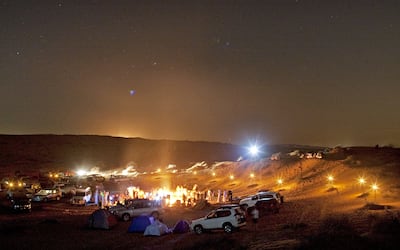A few weeks ago, I had the pleasure of joining a few friends for a dinner around the campfire in the deserts of Umm Al Quwain. It was a bit chilly, but that wasn’t a problem, since we were all well wrapped up. The food was excellent, the conversation flowed and the fire crackled and glowed, keeping us all warm. I haven’t done that for a long time and it was good to be reminded of how much I have enjoyed such occasions over the years.
So far, so good. Until I got back to my hotel late at night. And then I started to feel a bit short of breath and spent a somewhat restless night suffering from an asthma attack. In the morning, still feeling the effects, I cancelled my plans and drove back to Abu Dhabi, where, in due course, I sought medical advice. The probable cause, I was told, was the presence of particulates, or tiny particles, from the smoke from the previous night's campfire.
I had never had the problem before. In fact, when I was much younger, I spent a lot of time around garden bonfires without suffering from any problems. So the asthma attack, perhaps, was a symptom of age.

I was reminded of that incident 10 days ago, on the occasion of World Pollution Day, when I was driving through the Hajar Mountains on my way to the UAE’s East coast. The route I took passes by crushers, where rock is mined to make building materials. It was a fairly still day, with little wind, and above one crusher there was dust slowly dispersing across the area. There were no villages in the vicinity, but I remember how a few years ago, residents of a village in Ras Al Khaimah, close to the mountains, complained about the effect on health of the dust from quarrying. All over the world, especially in cities that rank high on the air pollution charts, particulate matter has the potential to be a serious problem.
I know from friends who used to be involved in the business that the quarrying companies are well aware of the issue. Rules laid down by the Ministry of Climate Change and the Environment and by the regulatory body of the Emirate concerned set strict guidelines and procedures, one of which included the extensive spraying of water to dampen the dust. That helps, I am sure. Although, as with other rules and regulations, there is probably scope for a greater degree of compliance and more enforcement.
It is not surprising that our environmental bodies devote a lot of attention to the complex task of monitoring air quality. The Environment Agency – Abu Dhabi, EAD, has a whole series of 24-hour monitoring stations spread throughout the Emirate, while there is also a network in Dubai. Both provide readings that enable comparisons with other major cities around the world. The online data also shows how air quality varies in different parts of Abu Dhabi and Dubai. Analysis of air quality looks at a variety of factors. Strong winds, for example, disperse air throughout the day or week. And during the rush hour in the morning and evening, more exhaust fumes are produced.
It is evident, though, that a lot of effort is being put into improving our current position, through regulation and the introduction of new techniques and equipment that reduce pollution.
In the UAE, we are relatively fortunate, by comparison with other big cities, which have much higher levels of air pollution. The occasional desert campfire doesn’t compare to major forest fires being seen in many parts of the world. On the roads here, it's rare to see old vehicles belching out clouds of exhaust fumes.
Is there any way in which members of the public can help, beyond their own private behaviour? Well, reporting to the authorities some of even the rare commercial vehicles that pump out noxious smoke might be an idea.
One way to improve matters is to enforce compliance of air quality rules on factories and quarries. This would benefit all of us, not just today, but in the long term, since lower levels of pollution will mean fewer related health issues in the future.
In the meantime, since the summer is coming, I won’t be sitting around campfires or wandering around areas too close to quarries.


